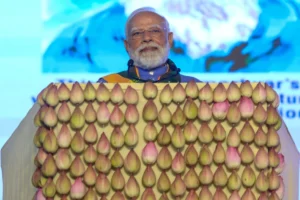
The Supreme Court has consistently taken a strict stance on air pollution, frequently reprimanding state governments for their handling of the issue. Stubble burning is often cited as a major cause of pollution. However, during a conference on eco-friendly farming, NGT member Justice Sudhir Agarwal claimed that stubble burning in Punjab is not responsible for air pollution in Delhi.
Criticized Fines Imposed on Farmers
Justice Agarwal condemned the practice of fining farmers and incarcerating them for stubble burning, calling it a grave injustice. He emphasized that no scientific study supports the claim that stubble burning in Punjab significantly contributes to Delhi’s pollution. He called for in-depth research to identify the real causes of air pollution in the region.
Shared Responsibility for Air Pollution
Agarwal stressed that addressing Delhi’s air pollution is a shared responsibility. Targeting farmers alone, imposing fines, and jailing them is unjust. Known for his historic decisions in the Ram Janmabhoomi-Babri Masjid case, Justice Agarwal highlighted the crucial role of farmers in environmental protection. He emphasized the importance of maintaining surface soil and adopting sustainable farming methods, noting that agriculture is intrinsically linked to the environment and thus farmers must help preserve greenery.
Also read: Delhi Excise Policy Case: Court Extends Judicial Custody For Manish Sisodia And K Kavita
Reflections on His NGT Tenure
Justice Sudhir Agarwal recalled his three-year tenure at the NGT, where he was frequently told that stubble burning caused pollution. He noted that 20-25 years ago, stubble burning was not blamed for air pollution. He pointed out that Punjab does not border Delhi but shares borders with Haryana, Uttar Pradesh, and Rajasthan. Additionally, he mentioned that specific wind speeds and directions would be necessary to carry the supposed polluted air from Punjab to the national capital.
To read more such news, download Bharat Express news apps


















